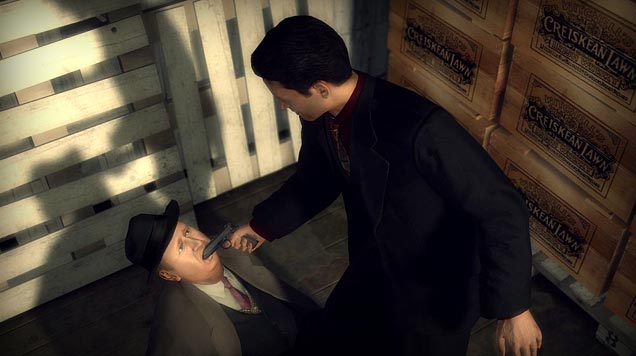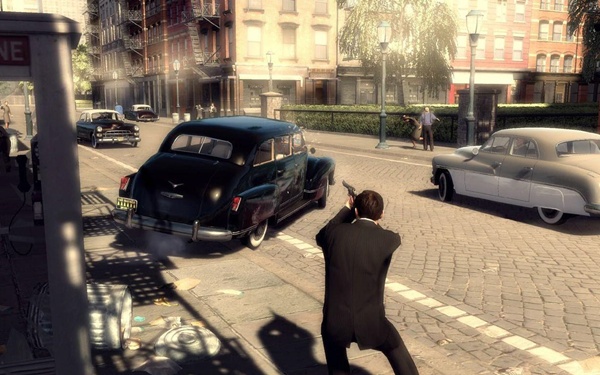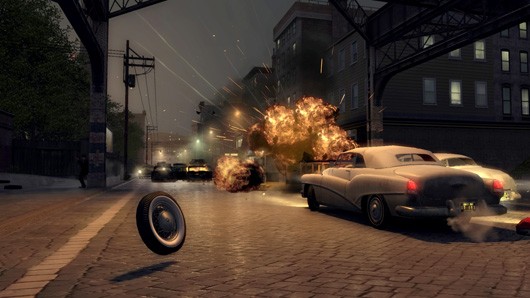This post has not been edited by the GamesBeat staff. Opinions by GamesBeat community writers do not necessarily reflect those of the staff.
 The first thing you should know about Mafia 2 is that you won't have to pretend that you're a race car driver.
The first thing you should know about Mafia 2 is that you won't have to pretend that you're a race car driver.
To players that had gone through the first Mafia, at least on the PC where it needed a patch to make that sequence fair, that's an immediate plus. I was about to give up and microwave the CD of the first game because of that crap.
But how does the sequel stack up? Now that's a racket lined with good intentions pounded into place with knuckle sandwiches, hot lead, and one of the greatest wastes of real estate in recent history.
The player is cast as Vito Scarletti, a young immigrant from Sicily who, with his family, settle down in Empire Bay. Growing up in the “Old Neighborhood”, he eventually gets into trouble with the law and given a choice between jail or fighting for Uncle Sam in WW2, he opts to head back to the Old Country to battle Il Duce's fascists.
He comes home as something of a hero, but even for a veteran like him, times are tough. In order to get some scratch to help cover expenses as well as get his mother and sister out from under his dead father's debt, Vito teams up with an old friend for a few easy scores that eventually turn out to be a lot more than he bargained for.
Vito's story is told with solid voice acting whose direction has also incorporated thick accents as boilerplate cliches to represent everything from Irish gangsters to Chinatown tongs, tarnishing an otherwise gripping account of one man's struggle between 'the life' and what he wants out of his own. The rank language delivers on the atmosphere – tea time this isn't. It can also occasionally feel forced for the sake of being raw with everyone spitting f-bombs and racial epithets as if they were going out of style, though Tony Montana has nothing to worry about.
 The story also underlines its problematic approach with a game of this scope: it aggressively fences the player in. Aside from doing things like crushing cars or selling them on the black market, two things that the game neglects to tell anyone about unless they accidentally stumble on them, there's not much else to do outside of its tight narrative.
The story also underlines its problematic approach with a game of this scope: it aggressively fences the player in. Aside from doing things like crushing cars or selling them on the black market, two things that the game neglects to tell anyone about unless they accidentally stumble on them, there's not much else to do outside of its tight narrative.
Sure, you can rob stores, visit clothing shops with anemic selections, or purchase weapons which will likely be all taken away again at a few places in the story, but none of these extracurricular activities really contribute any additional investment into the game outside of what is done within its story-based missions. Even the pretense of an economy is laughable since most of what I needed were taken from dead gangsters, police, or my refrigerator.
That simply feeds into the fact that there's no real point to exploring or doing anything in Empire Bay to actually feel like an earner. If there's one thing that EA's first Godfather game had gotten right, it was in shaking down locals as part of a racket to at least give the player some reason to hit the pavement. War hero Vito simply feels as if he's tagging along for the ride. It's like asking Robert DeNiro to play a down-and-out craps dealer in Casino and then expecting him to jump through hoops when things start getting antsy around the 'real' stars.
And that's a complete shame given the lush visuals worked into its world and its people as long as you can forgive some pop-in. There's also plenty of destructibilty worked into it right down to the popping tires on a burning car. Interiors are richly appointed with everything from wall stains and garbage to the worst décor imaginable (and I mean that in a good way) when it jumps from the 1940's to 1951, tempting the player with thinking that they can stretch their legs outside of the story only to realize that most of it is only window dressing.
A somber opening piece sets the pace for the extensive in-game soundtrack with an eclectic selection of period tunes from the 1940's and 50's to capture as much of the atmosphere as its surroundings, though in keeping with its fictional world, tracks don't specifically follow the exact year when they came out. Little Richard's “Long Tall Sally” and Dean Martin's “Let it Snow” round out an incredible list of licensed tunes across the game's three radio stations. Whether you'll actually hear all of it, though, depends on how often you want to drive around Empire Bay doing nothing.
 Worse still is in how the story treats Vito who can make the transition from war hero to cop killer in a heartbeat 'just because'. Making the jump from the guy who came home from the war to mobster made it feel as if Vito was quickly turned into a vehicle for gunplay, downplaying the atmospheric pretense that it had started with. Granted it can be seen as a method for pushing the player into a corner to make them feel what Vito does when he's 'living the life', but it too often feels as if it also wastes little time on taking the opportunity to create a deeper character with enough motivation to do those things. Michael Corleone he isn't.
Worse still is in how the story treats Vito who can make the transition from war hero to cop killer in a heartbeat 'just because'. Making the jump from the guy who came home from the war to mobster made it feel as if Vito was quickly turned into a vehicle for gunplay, downplaying the atmospheric pretense that it had started with. Granted it can be seen as a method for pushing the player into a corner to make them feel what Vito does when he's 'living the life', but it too often feels as if it also wastes little time on taking the opportunity to create a deeper character with enough motivation to do those things. Michael Corleone he isn't.
Cut scenes also pass the time between major arcs showing Vito and his buddy Joe carry out business in Empire Bay which is too bad considering that the game can be finished in about twelve hours, and that was with me doing little extra things like crushing cars and selling exports for a few quick bucks to buy a few extra heaters or in buffing up my closet choices only to lose them later. Part of me was left wishing that I could do some of the things that the cut scenes portray Vito doing than in simply watching him work over the city until the story needs him again.
Cops are somewhat more forgiving in Mafia 2 than in the first game which nailed you for things such as going through red lights, but they're still not as lenient as they are in other series such as GTA or Saint's Row. Empire Bay's finest will come after you for fines if you crash into someone while they're around, or are seen speeding. Make too much trouble on foot such as trying to rob a local eatery and citizens in the streets that might even take out their own pieces to administer some street justice.
Cops use several layers of identification to be persistent thorns. One is in getting a good enough description of you that only a change in clothes can get them off of your scent. Another is in changing the plates of the car you are in to keep it off of their radar in case they get enough info on your ride.
 Both make getting away from the law a lot more challenging than in other games, but as to whether they actually add anything to the experience eventually felt as if it were a pace killing waste of time despite offering options to customize your car. At least there's a speed limiter in the game to keep you from getting ticketed, but with all the driving that is done here, it only makes the game seem longer than it really is. And don't expect to use a taxi unless you want to steal it.
Both make getting away from the law a lot more challenging than in other games, but as to whether they actually add anything to the experience eventually felt as if it were a pace killing waste of time despite offering options to customize your car. At least there's a speed limiter in the game to keep you from getting ticketed, but with all the driving that is done here, it only makes the game seem longer than it really is. And don't expect to use a taxi unless you want to steal it.
My enjoyment of driving in Empire Bay depended largely on whether I could pick or smash my way into a nice, sporty clunker versus a large one that handles like a boat on four wheels. Whether I wanted a vehicle that handled like a living room or not also depended on how much I had invested in a few custom tweaks to improve the experience at the local garage, so getting around wasn't a problem unless you are caught picking the lock to 'borrow' a new car.
Safe houses provide a small garage for you to store a max of ten cars inside of them which is something of an allowance Mafia 2 allows the player. Regenerative health is also in play, but it's coupled to a health bar that doesn't always come back to full if you take more than a few serious hits. The odd thing is, even when sleeping in between mission arcs or chapters, you don't get all of your health back unless you eat something.
With Vito's war background acting as a convenient explanation for his ability as a gunslinger, the shooting isn't a bad experience with a decent variety of punchy weapons and plenty of flying wall plaster, shattered glass, and enemies that actually react to where you hit them. Enemies also tend to pop in and out of cover as if they had springs installed in their spines, sometimes with hilariously unintentional results requiring a Benny Hill track when the game senses that you are aiming right where their head should appear.
 Not every mission is created equal, either, but at least when it gives you an AI partner, you don't have to worry about them since they're conveniently indestructible unless the story asks for them to get hurt or drunk. A lot of time is also spent simply driving from point to point, advertising missed opportunities all around, with one particularly boring job timing me on visiting gas stations.
Not every mission is created equal, either, but at least when it gives you an AI partner, you don't have to worry about them since they're conveniently indestructible unless the story asks for them to get hurt or drunk. A lot of time is also spent simply driving from point to point, advertising missed opportunities all around, with one particularly boring job timing me on visiting gas stations.
Most, however, are pretty memorable such as sneaking into a government office to steal gas stamps during the 1940's or in taking out the head of one of the families running Empire Bay. As varied as they are, I could have done without the whole “wake up in the morning” that its confusion over realism asserts into the gameplay more times than I cared to remember.
A lot of the action pieces are interspersed with boring moments like these, but at least you won't have to take Joe out for bowling or darts. But with as many that had shown promise, others like Vito's time in prison felt filled with potential only to fall hard when I realized it served only to firm up the easy-as-pie pugilism that had as much depth as a milk saucer.
The fisticuffs do look as good as mowing through a room with a Thompson, though. Bloody and meaty hits are all a part of connecting with someone's face in Mafia 2, but it isn't Street Fighter for mobsters. Vito's fists also literally kill people, so knocking out citizens on the street will only add them as a statistic instead.
 But as far as complexity goes, I spent most of these fights holding down the dodge button, waiting for the swing, and then simply hitting back. Any fight can be won this way and once Vito learns how to counter later on (apparently the Army basics he trained under neglected the hand-to-hand part), it becomes another yawning chore to follow through with unless you're trying to get the associated achievement by picking fights on the street.
But as far as complexity goes, I spent most of these fights holding down the dodge button, waiting for the swing, and then simply hitting back. Any fight can be won this way and once Vito learns how to counter later on (apparently the Army basics he trained under neglected the hand-to-hand part), it becomes another yawning chore to follow through with unless you're trying to get the associated achievement by picking fights on the street.
Saves are handled by checkpoints which aren't always in the best spots, but they're manageable enough not to feel as if they're cheating you out of your time for the most part. If you've played through the missions in Grand Theft Auto IV or Saint's Row 2, these won't come as much of a surprise when you have to repeat small snippets of action. But some checkpoints also have the tendency to really stretch your patience when you start wondering when it will save after a particularly harrowing firefight.
Once the game ends, you might be asking yourself the same question I did when the credits started rolling: where's the ending? After playing through Kane & Lynch 2, I didn't expect a crime epic like this one to actually do the same thing and drop the player off with a “job well done” and little else other than the achievements to show for it. Why did the story quit on the player now?
The lack of multiplayer wouldn't have even been a consideration had there been more actual content to play through. Vito's buddy, Joe, had also gone bonkers at one point in the game which, thanks to the iffy checkpoints in the latter half, could have forced me to repeat a large swath of gunplay.
 What happened was that Joe apparently took it upon himself to shoot anything that moved for no apparent reason while we were running down a street. After changing clothes in a shop with him tagging along, he immediately started shooting at someone outside. Why? I have no idea, unless the guy he was shooting at had said something about my choice in suits.
What happened was that Joe apparently took it upon himself to shoot anything that moved for no apparent reason while we were running down a street. After changing clothes in a shop with him tagging along, he immediately started shooting at someone outside. Why? I have no idea, unless the guy he was shooting at had said something about my choice in suits.
There's not much of a reason to replay the game unless you're a completionist and want the achievements such as finding all of the Playboy centerfolds and wanted posters scattered throughout the game. Playing it on Hard raises the ante with more damaging hits and in removing enemies from your local radar (other than police which still show up), but otherwise, there's not much else left to invest in after Vito gives the last thug his lead sendoff.
As a fan, I kind of knew what to expect making it worth playing since it doesn't veer too far from its gameplay roots. Its take on the Mafia with caricatures blended against a predictable storyline packs in enough moments of cinematic flair to give many of its scenes something to stand on making it one of the best slices of 'the life' to hit shelves despite its flaws.
But part of me used to the open worlds that Rockstar and Volition have made of their own criminal empires set Empire Bay up as a half finished facade of possibilities that exist only on a wish list along with its missing ending. The included map festooned with period ads wanted me to live in Empire City, but it all too often feels as if I were simply passing through. For many associates looking to set up the long con, hitting it up as a temporary contract might be the better half of this deal.
Mafia 2
2K Games / 2K Czech
Xbox 360 / PS3 / Windows (360 version played)
Rated M for Mature
